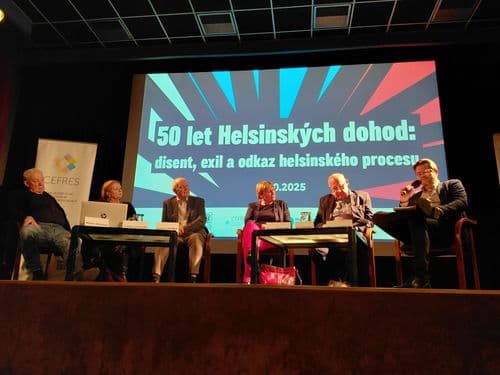Conference on the 50th Anniversary of the Helsinki Accords
Two colleagues from the Blinken OSA Archivum, András Mink and Ioana Macrea-Toma, participated in the international conference Helsinki at 50: Human Rights, Peace, and Security – Human Rights, Peace, and Security in Europe in the Perspective of Political Exile as a Non-State Actor in International Politics. The event took place in Prague from October 21 to 23, 2025, and was organized by the Institute of Contemporary History of the Czech Academy of Sciences and the French Institute in Prague, in cooperation with CEFRES.
Marking half a century since the signing of the Helsinki Accords, the conference brought together historians, political scientists, and archival researchers to revisit the lasting impact of the Helsinki Process on European political life. It focused in particular on the role of political exile communities as non-state actors who mediated between Western societies and the dissident movements of Central and Eastern Europe.
The event opened with a public debate featuring prominent figures of dissidence and exile—Jan Kavan, Ivanka Lefeuvre, Martin Palouš, Jacques Rupnik, and Anna Šabatová—and moderated by historian Michal Kopeček.
Rethinking the Legacy of 1956 and the Roots of Dissent
In his presentation, András Mink, Research Fellow at the Blinken OSA Archivum, examined the less visible but deeply significant links between Hungarian dissident circles of the 1970s–80s and the legacy of the 1956 Hungarian Revolution. Drawing on archival sources held at Blinken OSA—particularly the archives of the former Research Institute of Radio Free Europe and the personal papers of General Béla Király—Mink explored how Hungarian exiles in France and the United States kept the spirit of 1956 alive abroad. His research showed how this exile activism helped embed the revolution’s democratic message into the intellectual and political foundations of Hungary’s later opposition movements, which played a decisive role during the regime change of 1989–90.
Documentation as Resistance: The Romanian Case
Ioana Macrea-Toma, Associate Research Fellow at the Blinken OSA Archivum, presented a paper on Romanian exile networks in Paris during the late 1970s, a period marked by the emergence of Romanian dissent. Her study analyzed the exiles’ intensive work of documentation and interpretation—not limited to smuggling information or texts out of the country but encompassing the complex task of understanding and translating the realities of political radicalization and repression inside Romania. Based on the Romanian Subject Files within OSA’s collections, Macrea-Toma’s research traced how these exiles became knowledge brokers who turned information-gathering into a moral and intellectual mission of solidarity
Archives and the Legacy of Transnational Engagement
Through their contributions, both researchers highlighted the crucial role of archives in reconstructing the transnational networks that sustained the human rights movements of the late Cold War era. Their papers underscored how documentation, preservation, and exile activism intersected to keep alive the ideals of freedom, justice, and civic responsibility across a divided Europe.
The Blinken OSA Archivum is proud to see its scholars contribute to this international reflection on the intertwined histories of exile, dissent, and human rights—a dialogue that continues to shape our understanding of Europe’s modern democratic transformation.
